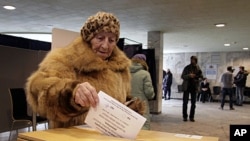Citizens in the European nation of Latvia are voting in a referendum Saturday to decide whether to make Russian the country’s official second language.
Although the second-language referendum is seen as having little chance of passing, the question has triggered a heated debate between the country's large ethnic Russian and Latvian populations.
When the former Soviet Union broke apart in 1991 and Latvia regained independence, most of its Russian-speaking citizens chose to remain in the country.
And even though the government in Riga offered them citizenship, some Russian speakers, such as swimming instructor Viktor Saltikov, say their voices are not being heard.
Saltikov says Russians would feel better if their language was made official. He says Russians are not going to vanish from Latvia, no matter how much some people would like them to.
But ethnic Latvians say that the Moscow-backed attempt to integrate the Russian language into the government is an attempt to weaken Latvia’s sovereignty and drag the former Soviet republic back into Russia’s sphere of influence. Andrejs Salaks, an accountant, says it is a question of civic duty.
Salaks says if there are still people in Latvia who do not know the official language, it means they have not tried to learn it. Even the prospect of obtaining citizenship has not urged them, he says, and this means they are not loyal to the country they live in. If the second state language is introduced, they would be left without any reason or motivation to learn Latvian.
Latvia is one of three small Baltic states that was part of the former Soviet Union for most of the 20th century. Many Russians moved into Latvia during that time, and about one-third of Latvia's people now speak Russian. The Russian and Latvian languages will be equally acceptable in matters of government if half of all eligible voters, more than 771,000 people, vote "yes" on the constitutional referendum.
Final results are expected in a couple of days.
Latvians Vote to Make Russian an Official Language




